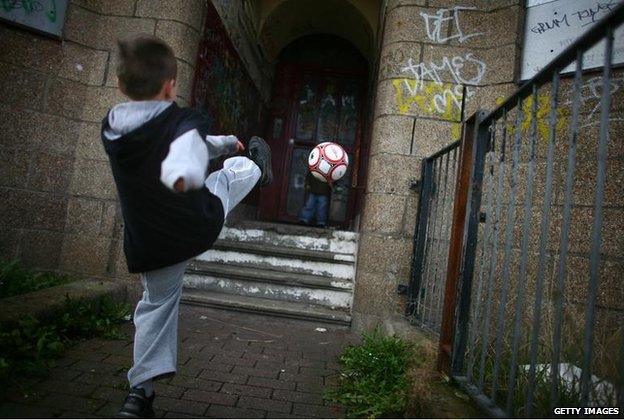Scottish independence: 820,000 Scots 'living in poverty'
- Published
The poverty figures were published by the Scottish government
The number of people living in poverty in Scotland increased to 820,000 last year, Scottish government-published figures have said.
The 2012-13 figure, which accounts for 16% of the population, was 110,000 more than in the previous year.
The number of children in poverty rose by 30,000 to 180,000, said the figures.
Scottish ministers said the statistics underlined the need for independence, but the UK government said it was taking action to tackle poverty.
The figures, external indicated:
16% of people (820,000) were living in relative poverty in 2012-13 - 110,000 more than the previous year and an increase from 14%.
19% of children (180,000) were living in relative poverty in 2012-13 - 30,000 more than the previous year an increase from 15%.
15% of working age adults (480,000) were living in relative poverty in 2012-13 - 70,000 more than in 2011-12.
15% of pensioners (150,000) were living in relative poverty in 2012-13, 10,000 more than the previous year and an increase from 14%.
Typical income in Scotland in 2012-13 was £23,000, equivalent to £440 per week.
Statisticians said the figures covered a period of time when there was little growth in the Scottish and UK economies, below-inflation increases in earnings and the introduction of UK welfare reforms.
Ahead of the 18 September independence referendum, Deputy Scottish First Minister Nicola Sturgeon, said: "Scotland is one of the richest countries in the world and there is no reason for children to be living in poverty in our society.

The Scottish and UK governments both said they were committed to tackling child poverty
"The fact is that the reduction in poverty seen in recent years is now being reversed. Westminster welfare reforms, such as the reduction in in-work tax credits, are reducing incomes for some of our poorest households.
"Today's figures demonstrate just how vital the full powers of independence now are, to enable us to create a different approach - one that supports our most vulnerable, encourages people into the workplace and provides a fair day's pay for a fair day's work."
The UK government said the new Universal Credit would make 300,000 Scots households better off by an average of £166 a month, while it had helped hard-pressed families with measures like a fuel duty freeze and cutting income tax for 25 million people.
A Department for Work and Pensions spokesman, said: "The UK government is committed to ending child poverty by tackling its root causes, including worklessness, low earnings and educational failure.
"Under this government there are 300,000 fewer children living in relative income poverty and 290,000 fewer children in workless households across the UK.
"As part of our long-term economic plan, we have seen the largest rise in employment for over 40 years and unemployment is falling. Relative child poverty in Scotland has fallen since the mid-1990s and is lower than 2009-10 levels."